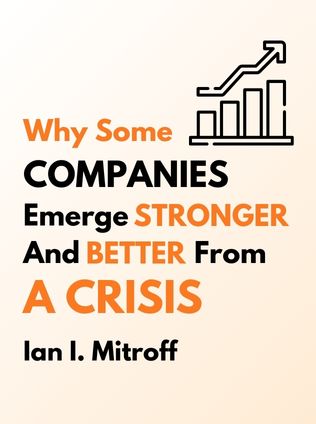
Why Some Companies Emerge Stronger and Better from a Crisis
7 Essential Lessons for Surviving Disaster
By Ian I. Mitroff
Published 02/2008
About the Author
Ian I. Mitroff is a distinguished professor in both the Marshall School of Business and the Annenberg School for Communications at the University of Southern California. Often referred to as the father of modern crisis management, Mitroff has authored numerous influential books, including Managing Crises Before They Happen and The Essential Guide to Managing Corporate Crises. His expertise in crisis management is unparalleled, and his insights have helped shape the way organizations prepare for and respond to crises.
Main Idea
In Why Some Companies Emerge Stronger and Better from a Crisis: Seven Essential Lessons for Surviving Disaster, Ian I. Mitroff explores the critical elements that enable organizations to not only survive but thrive in the aftermath of a crisis. Mitroff identifies seven essential competencies that companies must develop to effectively navigate and overcome crises. These lessons are counterintuitive yet profoundly impactful, emphasizing the importance of emotional intelligence, creative thinking, spiritual growth, and integrated crisis management.
Table of Contents
- Overcoming the Challenges of Crisis Management
- The Crisis Society: The Rise of the Abnormal
- Right Heart: Emotional IQ
- Right Thinking and Right Social and Political Skills
- Right Integration: Integrative IQ
- Right Technical Skills: Technical IQ
- Right Transfer: Aesthetic IQ
- Right Soul: Spiritual IQ
Overcoming the Challenges of Crisis Management
America's organizations face dire challenges on multiple fronts, from physical threats to moral and spiritual crises. Before 9/11, corporate America was largely unprepared for the wide variety of crises it might face. A crisis, by definition, is an extreme event that threatens the very existence of an organization, causing substantial injuries, deaths, financial losses, and damage to reputation.
Most executives are only prepared for a small number of worst-case scenarios. Mitroff outlines seven potential challenges that organizations must overcome to survive today's threats. These include developing high emotional intelligence, creative thinking, spiritual growth, political and social skills, technical knowledge, integrative thinking, and the ability to transfer new skills in the global economy.
Surviving Today's Threats
Learning these lessons can help organizations anticipate, plan for, and survive the inevitable crises that are part of modern life. Mitroff emphasizes the importance of acting in the public's best interest, not only because it is the right thing to do but also because it is more profitable in the long run.
"If you act in the public's best interest, you'll not only feel better, but it's more profitable in the long run." - Ian I. Mitroff
The Crisis Society: The Rise of the Abnormal
Mary Douglas, CEO of Rural Books, illustrates how unprepared companies can be for crises. When her company's books were linked to the deaths of a family and the serious illness of others, she found herself completely unprepared. Proper crisis management training could have equipped her and her team to respond more effectively, reducing both economic and emotional costs.
Mitroff highlights that crises are now built into the fabric of modern societies. Conventional management practices are insufficient for dealing with major crises like those involving Enron, WorldCom, and other significant disasters. Companies must learn to think like controlled paranoids to anticipate and mitigate potential crises.
"Conventional thinking simply can't anticipate and cope with 'abnormal states of mind.'" - Ian I. Mitroff
Right Heart: Emotional IQ
Crises extract tremendous emotional costs, demanding exceptional emotional capabilities. Douglas and her team were unprepared because they lacked the emotional resilience needed to manage the crisis effectively. Denial and trauma are common responses to crises, and overcoming these requires high emotional intelligence.
Betrayal is a common feature of crises, often leading to feelings of anger and the need to find someone to blame. Effective crisis management involves acknowledging these emotions and preparing for them through rigorous pre-crisis psychological training.
"Effective crisis management demands high emotional capacity and sensitivity, and emotional resiliency." - Ian I. Mitroff
Right Thinking and Right Social and Political Skills
Crises demand creative thinking and the ability to think outside the box. Conventional business principles are not sufficient for navigating crises, which require an expansive view of the organization and its potential vulnerabilities.
Bob Hunt, Head of Risk Management and Security at Rural Books, illustrates the importance of broadening the scope of crisis management. By gathering information from multiple channels and developing plausible crisis scenarios, organizations can better prepare for unexpected events.
Sign up for FREE and get access to 1,400+ books summaries.
You May Also Like
The Subtle Art of Not Giving a F*ck
A Counterintuitive Approach to Living a Good Life
By Mark MansonRich Dad Poor Dad
What the Rich Teach Their Kids About Money - That the Poor and Middle Class Do Not!
By Robert T. KiyosakiHow To Win Friends and Influence People
The All-Time Classic Manual Of People Skills
By Dale CarnegieQuiet: The Power of Introverts
The Power of Introverts in a World That Can't Stop Talking
By Susan Cain



















